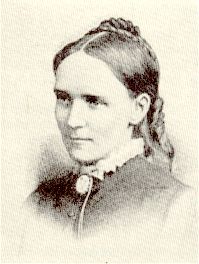Frances Ridley Havergal
(December 14, 1836 – June 3, 1879)
 was an English religious poet and hymn writer. Take My Life and Let it Be and Thy Life for Me (also known as I Gave My Life for Thee) are two of her best known hymns. She also wrote hymn melodies, religious tracts, and works for children.
was an English religious poet and hymn writer. Take My Life and Let it Be and Thy Life for Me (also known as I Gave My Life for Thee) are two of her best known hymns. She also wrote hymn melodies, religious tracts, and works for children.
She was born into an Anglican family, at Astley in Worcestershire. Her father, William Henry Havergal (1793–1870), was a clergyman, writer, composer, and hymnwriter. Her brother, Henry East Havergal, was a priest in the Church of England and an organist.
In 1852/3 she studied in the Louisenschule, Düsseldorf, and at Oberkassel. Otherwise she led a quiet life, not enjoying consistent good health; she travelled, in particular to Switzerland. She supported the Church Missionary Society.
She died of peritonitis at Caswell Bay on the Gower Peninsula in Wales at age 42. Her sisters saw much of her work published posthumously. Havergal College, a private girls’ school in Toronto, is named after her. The composer Havergal Brian adopted the name as a tribute to the Havergal family.
Works
Ministry of Song (1870)
Take My Life and Let it Be (1874)
Under the Surface (1874)
The four happy days (1874)
Royal Commandments (1878)
O Merciful Redeemer
Loyal Responses (1878)
Kept for the Master’s Use (1879) memoirs
Life Chords (1880)
Royal Bounty (1880)
Little Pillows, or Goodnight Thoughts for the Little Ones (1880)
Morning bells, or, Waking thoughts for the little ones (1880)
Swiss Letters and Alpine Poems (1881) edited by J. M. Crane
Under His Shadow: the Last Poems of Frances Ridley Havergal (1881)
The Royal Invitation (1882)
Life Echoes (1883)
Poetical Works (1884) edited by M. V. G. Havergal and Frances Anna Shaw
Coming to the King (1886)
My King and His Service (1896)
Forget Me Nots of Promise, Text from Scripture and verses by Frances Ridley Havergal, Marcus Ward&Co.